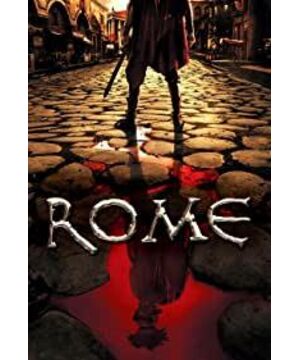The first episode:
The title uses animation combined with real people, and the effect is very good. The villain in the style of primitive murals dances on the wall, and the pedestrians who come and go can't see clearly. Due to the effect of deliberately causing frame skipping, I once thought that the computer graphics card was broken. . . -_-|||
At the beginning of the feature film, the background of the story is briefly explained: the balance of the Roman regime is gradually tilting towards Caesar, and the aristocracy is panicking. Then the camera turned, and there was a scene of Caesar's general Urinus fighting against Alesia in Gaul. A suspected drunk Polo broke the formation without authorization and punched Urinas. Afterwards, he was severely whipped and thrown into prison. He could not participate in the burning, killing and looting after the victory. He had to paint chickens as a pastime.
Although the battle was won, bad news came from the rear: Caesar's daughter, Pompeii's wife Julia, died in childbirth. When Caesar heard the news, he did not express any particular sadness, but said lightly: "Pompeii needs a new wife."
Caesar had the wealth seized from Gaul be brought back to Rome to be distributed to the masses; the elders of the House of Lords watched anxiously:
A divine white horse was brought into the city of Rome (this is a realistic representation of the city life of Rome). Caesar's niece Atia had sex with the man who brought the horse into the city, and "by the way" proposed that she wanted the horse. After getting what she wanted, she asked her son Octavian to bring the horse to Caesar as a gift, otherwise when Caesar returned home, everyone would want to give him a gift, so he would not be special. Octavian was a noble young man with basically zero ability to survive in the wild, and he did not agree with Caesar's continuous invasion of Gaul, but in the end he reluctantly agreed.
The next day, the Senate held a debate. The elder Cato attacked Pompeii, questioning why Caesar fought for years and wasted taxpayers' money (and didn't). Pompeii said he would not betray a friend/brother in any way. I personally like this scene very much, it reminds me of the contemporary British parliamentary debate (if you are interested, you can go to Weibo to search for related videos made by Mr. Guan Xinguan).
In the evening, Pompeii went to the small theater to watch the performance of Culture to the Countryside:
Seeing the excitement, Cato brought his friend and the friend's newly widowed daughter Cornelia to propose to Pompeii. Pompeii refused in his heart at first, and he couldn't help being bewitched by Cato again and again, and he had a grudge against Caesar and began to waver. This picture is too classic, it is the composition of the typical conspirators instigating others:
Knowing that the white horse he was looking for was succeeded by Atia, Pompeii was even more angry and said, "I want everything." So he sent his henchmen to Gaul, ready to "kill two birds with one stone".
At night, Caesar's barracks. The soldier who was wiping and polishing Caesar's golden eagle was killed by two blue-skinned Avatars, and the golden eagle was snatched away. Caesar believed that the soldiers in the battalion were already homesick, and that the spirit of the army would definitely be more disorganized, and even mutiny was possible, so he sent a capable general Urinus to lead people to look for it. Urinas, however, thought that this was like looking for a needle in a haystack with little hope, so he released the pineapple that had nothing from the prison, so that even if he couldn't find it, he would be punished. In the evening, Urinas put Pineapple on the first shift, but Pineapple fell asleep and their horses were snatched away. While trekking in despair, he met Octavian, the third generation of the rich who was kidnapped by bandits. After the two rescued Octavian (here very cleverly without showing too many fighting scenes), they accidentally found the blue paint on the car, it turned out that the same group of people hijacked Octavian and stole the golden eagle; this is Pompeii The so-called "two birds with one stone". The two found the golden eagle and returned to the camp in triumph.
Meanwhile, in the city of Rome. Caesar asked his niece to help choose Pompeii's next wife; Atia wanted her daughter Utavia to leave her current husband and marry Pompeii. Unexpectedly, Pompeii abandoned Utavia at all times, and immediately announced that he would marry Cornelia (the daughter of Cato's friend) when his conspiracy was revealed. Utavia was heartbroken, and Atia didn't want her to go back to her ex-husband (who wanted to use her marriage as political capital), so she told her mother that she would kill Pompeii. Atia was feeling disgraced because of her daughter's rejection, and was eager to take revenge on Pompeii. Caesar also wrote Pompeii, and said that he would visit him when he returned to Rome; a bloody storm was coming...
The biggest impression after watching this episode is that the ancient Roman aristocrats were really promiscuous, and the concept of chastity was negative; in addition, women were always regarded as political capital without any independence. Like Cornelia or Utavia, they can only obey the orders of their parents and marry whoever they want. Even a strong and independent woman like Atiya could only exist by relying on Caesar. In addition, Atiya is too cruel, forcing her own daughter to leave her husband and marry Pompeii, which is simply possessed by Tang Minghuang. After all, Tang Minghuang still had a process of seeking love, and asked Yang Yuhuan to go to Huaqing Palace to soak in a hot spring or something; Atiya, better, let her daughter and her husband make a clean break, and I heard Pompeii say that the wedding can only be done after the ex-wife's filial piety expires. Held, answer immediately The wedding can wait, but the daughter can let him enjoy it now. It can only be said that a woman who pursues power in a turbulent era can neither be measured by rational standards, nor can she love her; she is like the cow she killed alive, she has been reduced to a beast.
View more about Rome reviews











